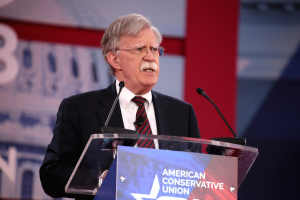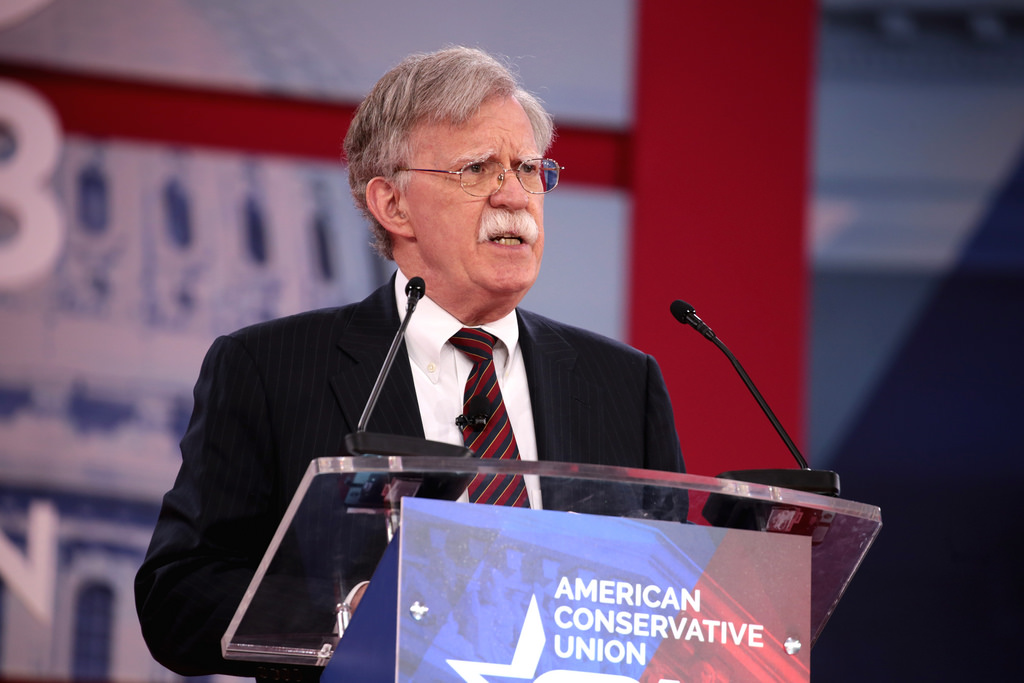
CUBA STANDARD — In a speech in Miami five days before U.S. mid-term elections, White House National Security Advisor John Bolton announced a tightening of sanctions against Cuba and Venezuela.
Bolton said that more Cuban entities would be added to an existing no-go list and hinted that more restrictions will be forthcoming. Responding to questions after his speech, he also said that the White House is “very seriously” considering allowing thousands of Cuban Americans to sue foreign companies in U.S. courts over their activities in Cuba.
“This is the time to increase pressure,” Bolton said in a question-and-answer session after his speech at the Freedom Tower in downtown Miami, after saying that the governments of Cuba, Venezuela and Nicaragua are “more vulnerable than it seems”.
The same day, the United States suffered diplomatic defeat again at the United Nations General Assembly, with 189 votes against those of the United States and Israel supporting a resolution condemning the U.S. embargo against Cuba. The General Assembly also rejected nine amendments proposed by the United States that would have condemned Cuba’s human rights record.
Expanding the blacklist, prohibiting indirect payments
Three hours later in Miami, Bolton announced that more than two dozen Cuban entities would be added to the State Department’s “Cuba Restricted List”.
John Kavulich, president of the New York-based U.S.-Cuba Trade and economic Council, wrote in his blog in September that the Trump administration has been preparing an expansion of the blacklist of Cuban entities that are off-limits for financial transactions by U.S. citizens, residents and businesses. The Trump administration first published a no-go list of mostly armed forces-linked entities a year ago. Now, the State Department will be adding more subsidiaries and forbids indirect payments, Kavulich wrote.
The list, targeting armed-forces holding GAESA, will now include “subsidiaries of subsidiaries”. It will also be updated monthly, requiring U.S. companies to dedicate more resources to compliance, Kavulich says.
The rationale behind the measures, he suggests, is to increase uncertainty, put a spotlight on the key role of the military in Cuba’s economy, particularly in tourism, and prod the Cuban government to provide more space to the private sector. Also, Trump has suggested that Cuba is to blame for Venezuela’s problems; the measures are part of an effort to press Cuba over its support for Venezuela.
However, the most immediate tactical consideration is probably securing more Cuban American votes in the upcoming U.S. elections. A day before the Bolton speech, President Donald Trump campaigned in Southwest Florida, and a day after Bolton’s appearance, former President Barack Obama was scheduled to campaign in Miami.
“It’s no surprise that four days before a critical election, the Trump administration has chosen political pandering over sound public policy,” said James Williams, president of pro-normalization group Engage Cuba. “Further squeezing U.S. private-sector activity in Cuba is a gift to our foreign competitors, emboldens the hardliners in the Cuban government, and rewards a dwindling minority of Americans who remain wedded to a failed policy that dates back over 50 years.”
Activating Title III?
Creating a bigger stir among foreign businesspeople and foreign embassies in Havana, the Miami Herald reported on Halloween night before Bolton’s speech that the Trump administration is pondering activation of a clause in the Helms-Burton law that would allow some 6,000 claimants to sue third-country companies in U.S. courts over properties confiscated after the Cuban revolution.
In the question-and-answer session after his speech, Bolton confirmed the Trump administration is “very seriously” considering activating Title III and that it wants to “analyze this issue with fresh eyes”. “I cannot say what will be the result of our analysis,” he added.
According to the Herald, the White House has discussed activating Title III of Helms-Burton — which has been routinely suspened every six months by all U.S. presidents since Bill Clinton due to backlash from close allies — with Sen. Marco Rubio and other pro-embargo Congresspeople.
Title III is the equivalent of a legal nuclear bomb. If activated, Title III, which was most recently suspended by Secretary of State Mike Pompeo on Aug. 1 for another six months, would open U.S. courts as a venue to sue companies from Spain, Canada, Italy, France, Britain and other close allies over “trafficking” of properties in Cuba that were confiscated after 1959.
Title III also allows naturalized Cuban Americans to file suit against “traffickers”, a move that goes against standards in international law. Including Cuban Americans who were not U.S. citizens when their property was taken could add 75,000-200,000 claims worth tens of billions of dollars.
“U.S. courts would be swamped, the ability of U.S. companies to do business on the island would be crippled, and allies abroad might retaliate for U.S. suits brought against their companies in Cuba,” wrote American University political scientist William M. LeoGrande in a Huffington Post column earlier this year. “The tangle of resulting litigation would take years to unwind.”
Direct salary payments
The Trump administration has also considered forcing U.S. companies to pay Cuban employees directly and in hard currency, instead of paying a Cuban state agency that then pays the employees, according to Kavulich. Cuba does not allow foreign investors to hire Cuban employees directly; while companies can now suggest and pick their candidates, they still have to pay salaries in hard currency to the state agency, which then pays the employees in non-convertible Cuban pesos at a 1:1 exchange rate (1:10 at the Mariel Special Development Zone).
In connection to the “Cuba Restricted List”, the Trump administration granted exemptions to U.S. companies with existing agreements in Cuba, such as hotel operator Marriott, Caterpillar dealer Rimco, and heavy equipment manufacturer John Deere. However, in this case Kavulich believes the U.S. government is trying to force U.S. companies into a showdown with Cuban authorities.
The list of companies that could be affected includes ABC Charters, American Airlines, Carnivael Cruise Lines, Cuba Travel Services, Delta Air Lines, JetBlue Airways, Norwegian Cruise Lines, Rimco, Royal Caribbean Cruise Lines, and United Airlines. Hotel operator Marriott International, which manages a 186-room hotel in Havana with an estimated 300 employees, would probably be most affected by the measure.
Anti-cruise protests
Meanwhile, a group of anti-Cuba activists in Miami that started a media campaign against cruising to Cuba this summer, with support from individuals with claims against Cuba, is preparing a series of protests against cruise lines offering voyages to Cuba.
According to the Breitbart website, a coalition of advocacy groups is planning a “large-scale caravan protest in Miami against cruise corporations choosing to do business with Cuba”. “The groups successfully completed a test run of the caravan protest .. and have planned to launch the full version of the protest during peak tourism season,” an article on the website says, based on an interview with one of the leading activists behind the caravan.
The organizers hope to put togther caravans of “hundreds of cars” and drive them to the Port of Miami, according to Breitbart. At least two individuals with claims argue that cruise ships using docks in Havana and Santiago are “trafficking in stolen American property”.
Talks with the Cuban government over settling the nearly 6,000 claims filed by U.S. entities were begun by the Obama administration, but the Trump administration discontinued them.

